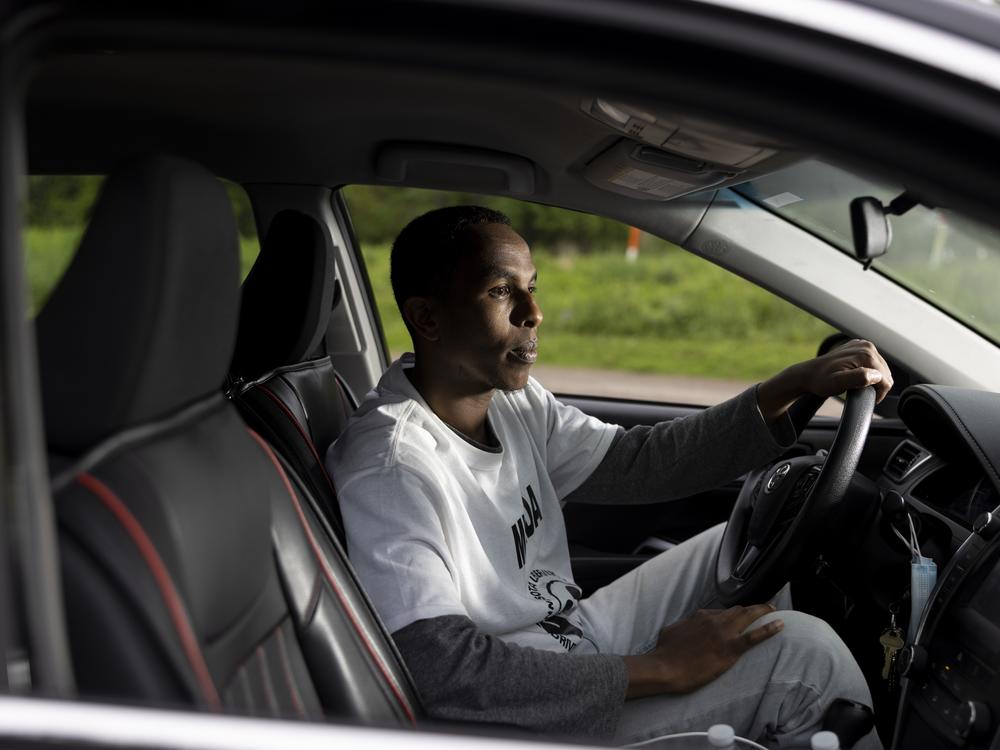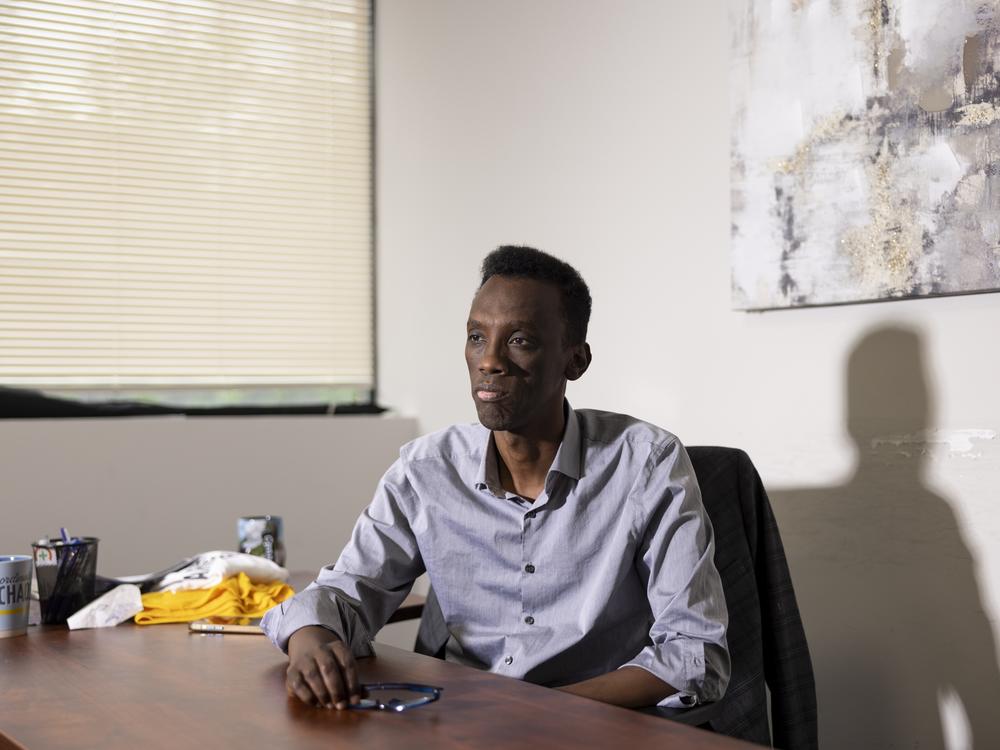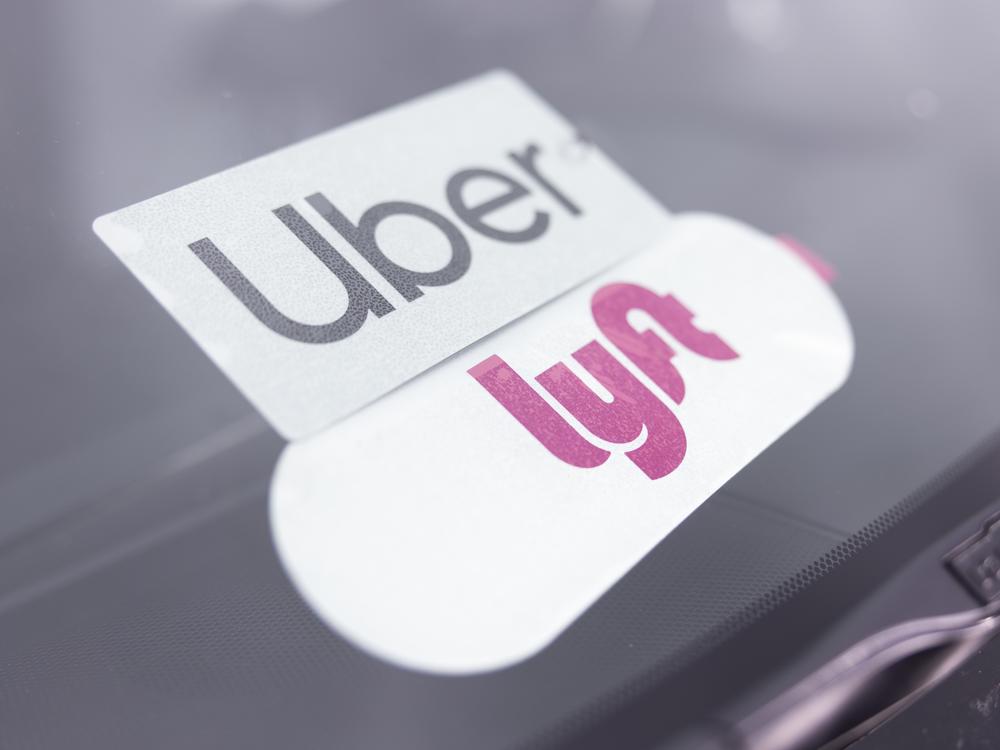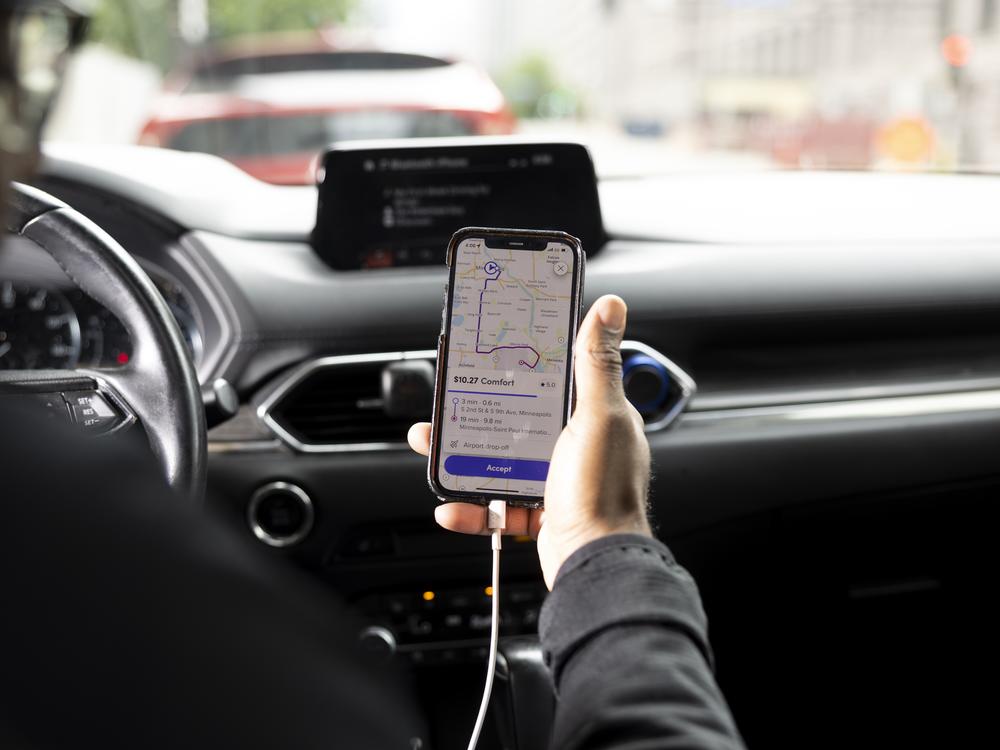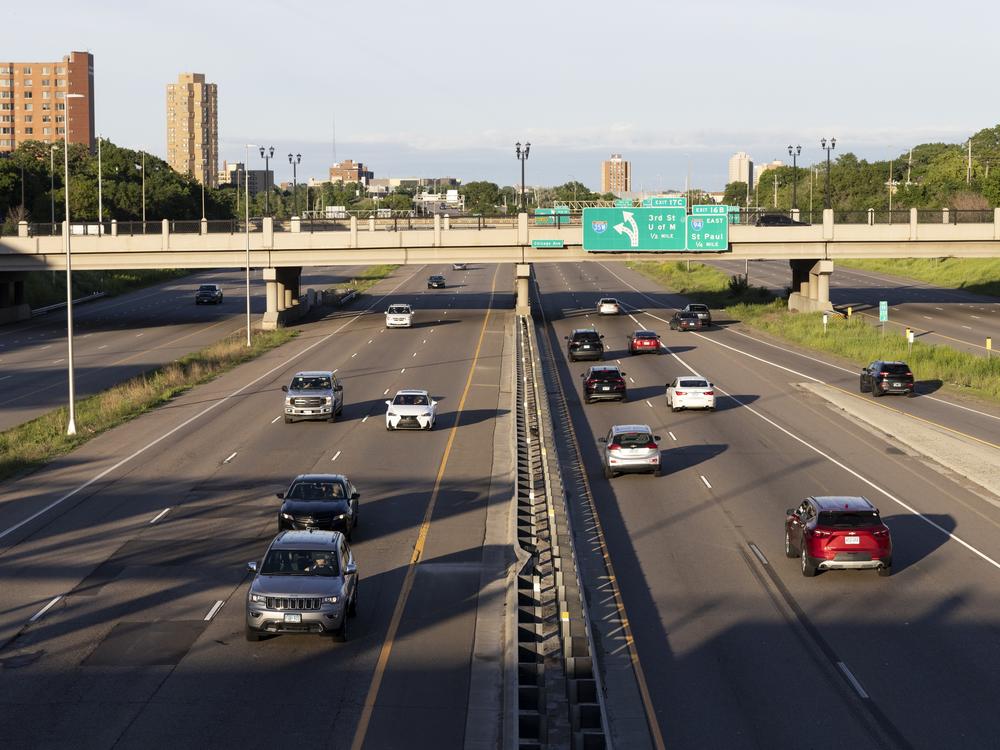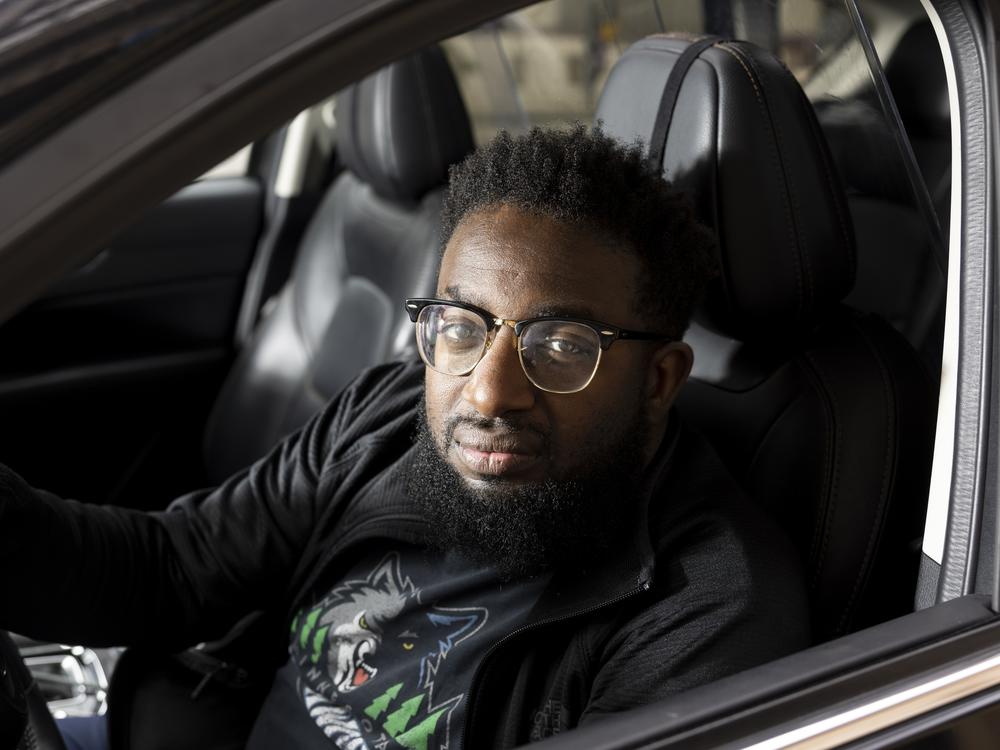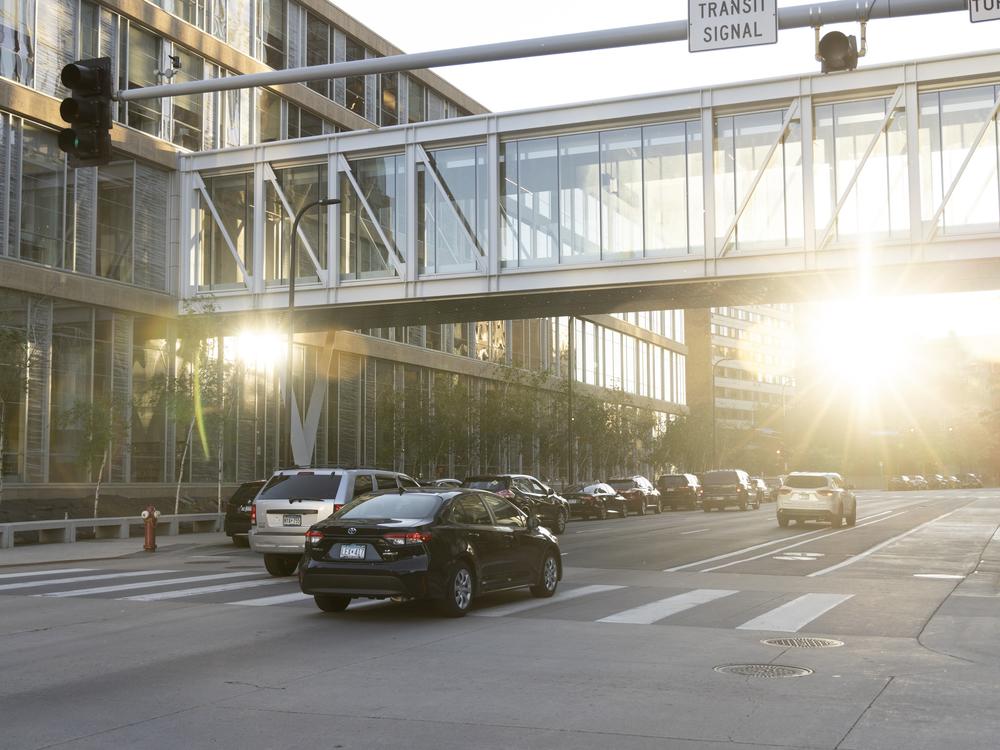Section Branding
Header Content
Uber and Lyft are fighting minimum wage laws. But in this state, the drivers won
Primary Content
In a windowless room, Uber driver Farhan Badel took the podium in front of a committee of Minnesota state legislators in early May. As Badel leaned into the microphone and started speaking, the room quieted. Testifying before lawmakers was something he’d done nearly a dozen times before, but he says this time felt like his last chance.
“We’ve been fighting for two long years,” Badel stated, referencing ride-hail drivers’ battle to get a minimum wage law passed in the state. He said his message to lawmakers was this: "Uber and Lyft, especially Uber, notorious for their shady lobbying … should not be allowed to dictate what becomes law in this state.”
The lobbying Badel referenced is part of a playbook Uber and Lyft have used in cities across the country to curb minimum wage laws for drivers. The San Francisco-based companies have barraged lawmakers with emails, sent warning messages to riders and drivers, and threatened to vacate states if they were forced to pay minimum wage.
In Minnesota, the campaign was particularly aggressive. Interviews with drivers and lawmakers, along with internal emails and documents obtained by NPR, show that Minnesota was the target of an intense operation.
That hearing where Badel testified was the latest twist in a whiplash series of events. Over the last two years, ride-hail drivers had organized and grown into a more than 1,300-member group that marched at City Hall, met with lawmakers and brought national attention to their plight.
They had seen wins and losses in dizzying succession: Three separate bills mandating minimum wage for ride-hail drivers passed at the state and city levels, only to get unexpectedly vetoed by Gov. Tim Walz or Minneapolis Mayor Jacob Frey. The drivers say it felt to them like a true David and Goliath situation, pitting them against multibillion-dollar corporations that seemed to hold far more power.
This spring it reached a boiling point. After gains by the drivers, Uber and Lyft stepped up their lobbying campaign and threatened to pull out of Minneapolis.
“This is part of their corporate playbook,” says Laura Padin, who studies lobbying in the gig economy at the National Employment Law Project, a labor rights advocacy organization. “The fact that they can issue threats and say ‘We're going to leave if you treat us like everyone else’ is a big problem.”
Spokespeople for Uber and Lyft say the proposed minimum wage would have left the companies unable to sustain their businesses in the state. Uber says it would have made Minnesota “one of the most expensive markets in the country,” and Lyft says it would have made “prices rise so much that we would have seen a 51% decrease in ride requests.”
Walz and Frey, both labor-friendly Democrats, had been adamant that they wanted ride-hail drivers to make a livable wage. They also took the companies, and their warnings, seriously.
“From the very beginning, I had two primary goals,” Frey told NPR in an interview. “To get a very significant pay increase for drivers and to keep this very important rideshare service, including Uber and Lyft, in our city.”
Similar scenarios have played out in New York and Seattle, which ultimately passed city minimum wage laws. But every state law governing driver pay and protections that has been crafted to date has included provisions backed by Uber and Lyft — through their lobbying and public campaigns. For example, in California, the companies spent a combined $108.5 million on a successful ballot measure campaign to exempt them from a state labor law. Another statewide battle happened in Washington, and one is underway in Massachusetts.
But in Minnesota, something wholly unexpected happened last month — the drivers won.
'The worst I’ve seen in eight years'
It all started in a small coffee shop in Minneapolis. In the summer of 2022, ride-hail driver Eid Ali gathered with about 20 Uber and Lyft drivers to talk about low pay, safety concerns and other issues that come with the job. Ali is a father of five and the sole provider for his family. Before he started driving for Uber and Lyft in 2014, Ali was a taxi driver and had done some organizing. He says this helped him and the other drivers come up with a game plan.
The first step was to recruit more drivers. Ali and the others went to shopping malls and airport parking lots to speak with drivers. They also went to mosques — the majority of ride-hail drivers in Minneapolis are immigrants, according to state data, with many from East Africa, especially Somalia.
The drivers coalesced in a group called Minnesota Uber/Lyft Drivers Association, or MULDA, and Ali became the president.
He says drivers reached out to him constantly about not being able to make ends meet. “Family folks raising kids, who depend on this income, are coming to me every day and telling me ‘I don't know what to do,’” Ali says. “I was thinking that if I don't do anything, if I don't fight a few more days or maybe a few more weeks, who's going to do that?”
Uber and Lyft categorize drivers as independent contractors rather than employees. This means drivers pay their own expenses such as gas, car maintenance and cellphones, and they don’t have employee benefits, including health insurance, sick days and workers’ compensation.
Low pay is the top problem, drivers say, as their earnings have steadily shrunk and become harder to predict. In 2022, both Uber and Lyft switched how they paid drivers, going from a time-and-mileage calculation to an opaque algorithm. Uber and Lyft say the software helps drivers pick and choose trips, but drivers say since that change they’ve seen the companies take a bigger cut, while they’ve gotten less.
Sergio Avedian, a longtime ride-hail driver in Los Angeles and senior contributor to the popular blog the Rideshare Guy, says thousands of drivers regularly send him their pay stubs. “This is the worst I've seen in eight years,” he says, estimating he often earns less than minimum wage after expenses. “But people are driving, they're desperate.”
In the Twin Cities metro area, where 95% of all of Minnesota's ride-hail trips happen, the median take-home wage for drivers is $13.63 per hour, according to a report by the Minnesota Department of Labor and Industry. That’s below the minimum wage for large businesses in St. Paul ($15) and Minneapolis ($15.57).
Uber’s spokesperson calls this report “flawed." Lyft didn’t respond to questions about driver pay.
Uber and Lyft have shaped minimum wage laws in their favor in other states. In Washington, for example, after Seattle passed a minimum wage for ride-hail drivers, the two companies lobbied legislators to pass a state law. That law gives drivers a minimum pay floor but also grants a key concession to the companies: ensuring that the drivers remain classified as independent contractors, which exempts the companies from providing customary worker benefits.
By the fall of 2022, hundreds of drivers had joined MULDA, with the campaign crystallizing around the push for a minimum wage. That October, they held their first press conference at the Minnesota state Capitol. “Drivers are at a breaking point,” Ali announced, alongside state lawmakers that day. From there, their cause quickly picked up steam.
By March 2023, state legislators had introduced a bill that set out minimum pay and other protections for ride-hail drivers. It swiftly passed the House and Senate and landed on Walz’s desk in late May 2023.
All signs pointed to Walz signing the bill, Badel says. The drivers got ready to celebrate a victory.
“Insiders told us to come to the state Capitol the day when they signed all these bills,” Badel says. “They told us to come there dressed well — you know, look presentable, look happy. So, we were getting all these checkmarks that he was going to sign the bill.”
A lobbying blitz
What Badel and Ali didn’t know was that Uber and Lyft’s lobbyists were hard at work behind the scenes.
Days before the governor received the bill, the companies’ lobbyists sent a slew of emails to his staffers and colleagues, according to public records obtained by NPR. Those included “talking points and numbers” that said rider fares would skyrocket if the bill passed. In Minneapolis, they said fares would go up 70%, without citing specific data.
Loading...
Brent Kent, a registered lobbyist for Lyft and the company’s director of public policy, sent a letter to Minnesota’s Senate president saying the bill would have a “catastrophic impact” and create “transportation deserts.” Rides in Minneapolis would go from $17 to $54, he said, also not citing specific data for that statistic.
As signing day neared, the lobbyists ramped up their efforts. They requested phone calls between Walz and the CEOs of both Uber and Lyft. At one point, Uber lobbyist Joel Carlson emailed the governor’s legislative assistant asking for an alternative email for the office, because he said he had a lot of people wanting to write in with opposition to the bill and didn’t want to “email bomb” her.
Carlson also fired off “veto request” letters he collected from 11 community groups — business and hospitality associations as well as organizations that work with people with disabilities, the elderly and domestic violence survivors. At least half of those groups have partnered with Uber or Lyft, but that wasn’t disclosed in their letters.
Uber’s spokesperson says it “engaged many organizations and local stakeholders to ensure they understood the impact of the legislation” and “many decided to express their concerns.” The spokesperson also confirmed that Uber CEO Dara Khosrowshahi had spoken with the governor.
“We urged the governor to veto the bill publicly, as well, via issued statements and in emails to riders and drivers,” the spokesperson says.
Lyft didn’t respond to questions about its involvement with the letters from community groups or conversations between its CEO and the governor.
Days before the anticipated signing, the companies rolled out a tactic they’d used in California, New York, Texas and other states: They threatened to leave the state if the bill was signed into law.
By May 25, 2023, Ali says he and the other drivers were anxious about the outcome. They gathered in front of Walz’s office chanting, “Governor sign the bill!”
That afternoon, Walz issued his first and only veto in four years as governor.
His veto letter started off saying the minimum wage bill “could make Minnesota one of the most expensive states in the country for rideshare.” It cited the need to maintain ride-hail services in the state and also referenced the letters from community groups.
A spokeswoman for Walz says that alongside the veto, the governor formed a task force to study the issue. She pointed NPR to a press release where he said, “Rideshare drivers deserve fair wages and safe working conditions … This is not the right bill to achieve these goals.”
Ali says it was a big surprise and a major blow for MULDA. “That was my worst nightmare, because I didn’t know what to say to those drivers.”
'You’re our last resort'
As the state bill made its way through the Legislature, the MULDA drivers were also simultaneously working with city council members in Minneapolis. After the governor’s veto, the drivers reorganized and went all in at the local level — becoming ever-present at City Hall.
“They came to City Hall many, many times, saying: ‘Government officials, you’re our last resort,’ ” says Robin Wonsley, the Minneapolis council member for Ward 2.
“The makeup of the workforce for the rideshare companies is predominantly Black, predominantly immigrant and also predominantly low income,” she added. “And many of these drivers, or a disproportionate number of these drivers, are actually on public assistance.”
She joined fellow council members Jamal Osman, who’d introduced her to MULDA, and Jason Chavez to work on a city ordinance. They reached out to economists and experts to come up with a calculation that would be equivalent to the city’s minimum wage. Uber and Lyft only pay drivers when they’re giving rides and not when they’re waiting for a passenger, so a straight hourly wage wouldn't work. The ordinance they introduced mandated that drivers be paid $1.40 per mile and 51¢ per minute.
It passed the council in August 2023 by a 7-5 vote. But behind the scenes, the companies' lobbyists were leaning hard on Frey.
As with the governor, Uber and Lyft’s lobbyists targeted the mayor, according to internal emails obtained by NPR through public records requests. Lyft's Kent reached out to staffers saying the company had “grave concerns.” He sent the mayor and council members an opposition letter from a Lyft executive that had one sentence bolded and underlined: “Should this proposal become law, Lyft will be forced to cease operations.”
Meanwhile, Uber’s Carlson called the ordinance “problematic.” On Aug. 21, Carlson emailed a senior aide at City Hall, saying he had spoken with the mayor.
“Uber understands the importance and optics to provide a thoughtful response to the council’s vote and have offered to him the opportunity to announce the following if he chooses,” the email reads. Carlson said the mayor could announce that Uber pledges to give drivers a minimum wage and a $5 minimum on all trips. He sent suggested language for the mayor’s announcement.
The next day, Frey vetoed the ordinance. In his veto letter, he said he’d work on another ordinance that included all stakeholders. The mayor also wrote that he was “pleased to share” that he secured a commitment from Uber to provide drivers a minimum wage and a $5 minimum per ride.
Uber’s spokesperson says the minimum wage guarantee “was not part of any negotiations.” A spokesperson for Frey says the commitment from Uber “was not in exchange for a veto.”
Wonsley says she was outraged.
“Why are we having city leaders now supporting a multibillion-dollar corporation and having an exemption from a city policy that hundreds of small businesses have been in compliance with?” she says, referring to the city’s minimum wage law. “And then he announced a nonbinding agreement with Uber, saying, ‘Look, we don't need to change nothing, the company has made a commitment, a symbolic commitment to pay drivers more.’ ”
“We were like ‘Wait, what?’ ” Wonsley adds. “That makes absolutely no sense.”
Frey’s spokesperson says the commitment from Uber “was never intended to be a permanent solution.”
Public pressure campaign
The mayor’s veto, coming after the governor’s veto, could have been the end for MULDA drivers’ quest to get a minimum wage law. In other states that went through similar scenarios, such setbacks have taken the wind out of organizing efforts. But Ali and Badel say they came too close to give up. And council member Wonsley says she wasn’t ready to back down either.
She and her colleagues introduced two more ordinances in October 2023. One focused on minimum wage, the other on worker protections.
Less than six months later, the council passed the new minimum wage ordinance by a 9-4 vote. The next day, once again, Frey vetoed the ordinance.
“I asked the City Council to wait one day,” says Frey, until after the release of the statewide report on driver earnings. “Both times I vetoed it because it wasn't supported by the data. And so, we should be listening to the data.”
This time, however, the council had enough votes to override his veto.
With this go-round, Uber and Lyft kicked their pressure campaign up a notch. Instead of mostly working with lawmakers behind closed doors, the companies brought their lobbying to the public.
“It's been a full-court press campaign,” Wonsley says. “Every single day there are several articles, interviews in the press, basically demonizing our actions and creating a lot of confusion for the public around what our policy actually accomplished.”
The day after the veto override, Uber and Lyft announced they were leaving Minneapolis as soon as the ordinance went into effect. It was around this time that Matthew McGlory, a MULDA member and longtime Uber and Lyft driver, started getting in-app messages and emails from the companies.
“We know that this decision will have a huge negative effect,” a message from Uber read. “It will put thousands of drivers — like you — out of work.” Uber provided a link to email lawmakers urging them to pass statewide legislation that could preempt the city ordinance and be more favorable to the companies.
Lyft, meanwhile, sent an email to its riders saying the ordinance would make rides “unaffordable” for the majority of residents. Lyft’s spokesperson didn’t respond to questions about the in-app messages. Uber’s spokesperson says, “The message speaks for itself.”
There was also a flurry of activity in the local news. Uber put an online ad in the Star Tribune saying Minneapolis was “forcing” it to leave and offered a button to click to “save our rides.” Dan Meyers, a director at disability advocacy group Rise, wrote an op-ed saying the ordinance would be “devastating to the disability community.” Lyft and Rise are longtime partners, which wasn’t disclosed in the op-ed.
A spokesperson for Rise says, “Our work with Lyft is well-known among our peers and partners.” Lyft didn’t respond to questions about any possible involvement with the op-ed.
Even with the ordinance set to go into effect in Minneapolis, MULDA drivers say they were still nervous. A statewide bill could preempt the city ordinance and undercut their pay. It was hard to tell which way it would go.
'No one else has been able to do this in the country'
The same day Farhan Badel took the podium in early May pleading with state lawmakers to not let the ride-hail companies dictate the law, Uber’s Carlson also spoke. They were discussing a compromise state bill that would preempt the Minneapolis ordinance — it offered drivers a rate of $1.27 per mile and 49¢ per minute. Carlson told the lawmakers this wouldn’t work for Uber.
“Uber has calculated that if you reasonably calculate the expenses you come up with a rate of 41¢ per mile and 68¢ per minute,” he said.
The legislators left that hearing without giving any indication which way it would go. But a couple of weeks later, they made a move that stunned observers.
On the night of May 19, the state passed a new bill giving drivers the minimum wage rate of $1.28 per mile and 31¢ per minute. Even though it was slightly lower and preempted the Minneapolis ordinance, Wonsley and the council backed it. Frey says he was opposed to the preemption, but that he ultimately supported the bill too since he says it was “nearly identical” to what he proposed months earlier.
It was a major win for the MULDA drivers. After the bill's passage, in a moment of jubilation in the Capitol’s hallways, they hoisted one of the state legislators in the air and chanted “MULDA” over and over. The legislator, Sen. Omar Fateh, who was instrumental in getting the bill passed, said, “It was Uber and Lyft versus MULDA and MULDA won.” The crowd erupted in cheers.
Spokespeople for Uber and Lyft say the companies accepted the compromise, and that neither will shutter operations in the state. Unlike the minimum pay laws for ride-hail drivers in California and Washington state, Minnesota's bill doesn’t mandate that drivers remain independent contractors — something Uber and Lyft had sought, but didn’t get.
On May 28, Walz signed the bill into law with Ali by his side wearing a white MULDA T-shirt. During a press conference announcing its passage, the governor congratulated state lawmakers. “No one else has been able to do this in the country,” Walz said.
The driver McGlory says MULDA has heard from drivers in other states who have been watching Minnesota over the past year and a half, waiting to see what happened.
“I'm doing this not just for drivers in Minneapolis. I'm doing this for the drivers in Nashville, Tenn. I'm doing this for drivers in Jackson, Miss.,” McGlory says, pausing for a moment before continuing. “Because when we educate ourselves, when we organize ourselves and we mobilize ourselves, we can win.”
“Like my favorite physics teacher said, ‘We have to become an unstoppable force that meets an immovable object.’”

